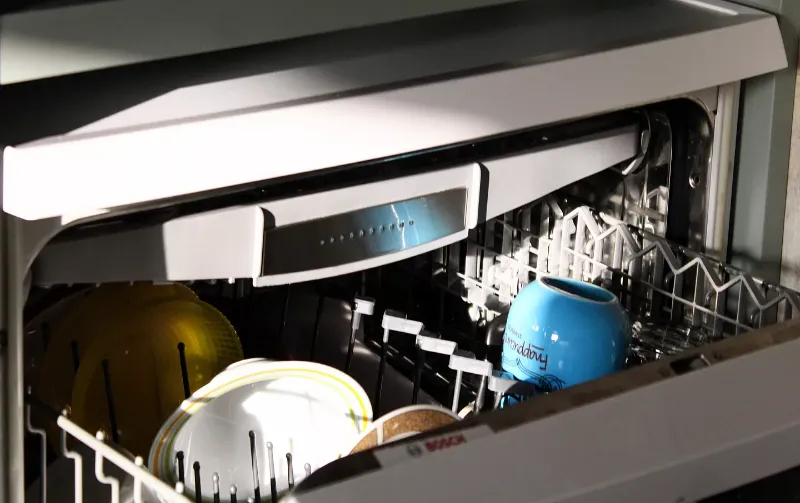Dishwashers can be environmentally friendly if used efficiently. Overuse or inefficient models contribute to higher water and energy consumption.
Modern dishwashers offer a greener alternative to hand washing by innovatively conserving energy and reducing water usage when loaded properly and run with full loads.
These appliances are designed to meet strict environmental standards, such as the ENERGY STAR certification, which ensures they use less water and energy compared to washing dishes by hand.
By choosing eco-friendly models and using them responsibly, households can minimize their environmental impact.
It’s important to select dishwashers with high-efficiency ratings and to operate them in an eco-conscious manner to ensure they are as environmentally friendly as possible.
Transitioning to eco-friendly dishwashers and adopting sustainable practices can significantly contribute to water and energy conservation efforts.

The Impact Of Dishwashers On The Environment
Many environmental advocates scrutinize dishwashers for their water and energy consumption.
Modern dishwashers are subject to stringent efficiency standards, which has led to advancements making them often more efficient than hand-washing dishes.
A typical dishwasher uses approximately 12 liters of water per cycle compared to the 38 liters involved in hand-washing.
Energy Star-certified dishwashers can save almost 5,000 gallons of water per year, proving to be beneficial for water conservation efforts.
Nevertheless, the use of chemicals and detergents in dishwashers raises concerns.
These products may contain phosphates and other pollutants that can contribute to water pollution if not properly treated in sewage plants.
Companies are progressively developing eco-friendly detergents that minimize harmful environmental impacts, encouraging consumers to make a conscious choice toward greener alternatives.
Water And Energy Consumption
Dishwashers have often been scrutinized for their environmental impact, particularly concerning water and energy consumption.
When assessing these appliances against hand washing, studies indicate that modern dishwashers are surprisingly efficient.
Many newer models come equipped with eco-friendly features that minimize water usage, sometimes using less than half the water that careful hand washing would consume.
Specifically, an Energy Star-certified dishwasher can save nearly 5,000 gallons of water per year compared to washing by hand.
These dishwashers often include soil sensors that adjust cycle length and water usage to the level of dirt on the dishes, efficient jets, and advanced filtration to make the most of the water that is used.
Chemicals And Detergents
Dishwashers come under scrutiny for their environmental footprint, predominantly due to the chemicals and detergents used.
These substances often contain phosphates and other compounds that may contribute to water pollution, impacting aquatic ecosystems and posing a threat to wildlife.
Eco-friendly detergents present a more sustainable option, featuring biodegradable ingredients that are less harmful to the environment.
Consumers seeking sustainable alternatives can opt for detergents with minimal environmental impact.
These are typically made from plant-based ingredients, are phosphate-free, and are designed to be efficient at lower temperatures, which further reduces energy consumption.
| Option | Features | Benefits |
|---|---|---|
| Eco-friendly Detergents | Biodegradable, Plant-based | Lessons water pollution, Safer for aquatic life |
| Energy-efficient Dishwashers | Effective at low temperatures | Reduces energy use, Lower carbon footprint |
Frequently Asked Questions On Are Dishwashers Bad For The Environment
Do Dishwashers Consume A Lot Of Energy?
Many modern dishwashers are designed to be energy efficient, often consuming less energy than washing by hand, especially if they are ENERGY STAR rated.
Can Dishwashers Affect Water Usage?
Dishwashers typically use less water than hand washing, with efficient models using approximately 3 gallons per load versus up to 27 gallons for manual washing.
Are Dishwashers Recyclable At End-of-life?
Yes, dishwashers contain recyclable metals and plastics, but proper recycling depends on local facilities and appliance recycling programs to dismantle and reclaim materials.
How Do Eco-friendly Dishwasher Detergents Help?
Yes, dishwashers contain recyclable metals and plastics, but proper recycling depends on local facilities and appliance recycling programs to dismantle and reclaim materials.
Conclusion
In essence, dishwashers have both pros and cons for the environment. Efficient models can save on water and energy.
Yet, the production and disposal of these appliances do impact natural resources.
Choosing eco-friendly options and using them wisely is key. Let’s embrace greener practices for a healthier planet.
